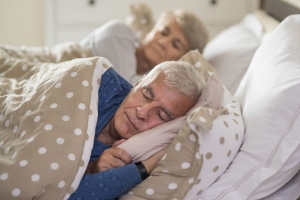This month we are celebrating the health benefits of sleep for mind and body! National Sleep Awareness Week is March 13-19, 2022—it’s the perfect time for older adults to learn new ways to improve their sleep routine.
Throughout the COVID-19 pandemic, adult sleep habits were affected in many ways. Some people slept more while others didn’t sleep enough. Many of us were tossing and turning through the night. Additionally, many adults got into some pretty poor sleep habits… staying up late or falling asleep in front of a mobile device.
Poor-quality sleep is detrimental to the health of the brain and the body. In fact, there’s 25 years of scientific research that supports the health benefits of good sleep hygiene for adults (and kids, too).
How Do We Know Sleep is Good for Health?
In order to understand the effects of sleep deprivation on our physical and mental health, scientists study how the brain and body respond when we don't sleep enough.
Insufficient Sleep Increases Risk for Illness
Insufficient sleep increases a person’s risk for chronic disease. When you get less than 8 hours of sleep a night on a regular basis you raise you risk for:
- diabetes
- heart disease and stroke
- anxiety
- depression
- colds, flu, and respiratory illness
- obesity
- cognitive impairment
While You Were Sleeping: How Does Sleep Affect Health?
No matter your age, sleep effects brain chemistry and the hormones that circulate through your body. Put another way, sleep influences the functioning of the nervous, immune, and endocrine systems.
When you get sufficient, quality sleep a lot of amazing things happen in your body:
- the brain develops and reinforces brain pathways that are involved in memory, learning, and emotion
- the body manufactures hormones that are involved in repair and growth, and which help minimize the effect that stress can have on our physiology. These hormones support the health of the liver, the development of muscle and bone, that break down fat, and the regulation of blood sugar
- the immune system gets a boost so that it is more effective at fighting infection
- the body works to decrease inflammation, which protects us from chronic illness such as diabetes and heart disease
- the metabolic system manages hormones that the body relies upon to regulate appetite
As you can see, sleep affects a lot of what goes in the body and how healthy (or unhealthy) your body can be.
How Much Sleep Does an Older Adult Need?
Throughout the lifespan, the amount of sleep we need changes. Also, regardless of age, the amount of sleep you need is influenced by the quality of the sleep you do get, your activity level, and genetics (e.g., some of us really are night owls). Adults typically need 7 to 9 hours of sleep with older adults on the lower end of the range. A very physically active older adult might need more than a sedentary or less active older adult.
5 Tips to Help an Older Adult Develop and Maintain Good Quality Sleep
The following tips can help older adults maintain good quality sleep habits:
- Stick with a Sleep Routine. A sleep routine includes soothing pre-bedtime rituals or steps each night, such as a warm bath, reading (in another room), meditation, or gentle stretching. You’ll want to go to bed and wake at the same time each day. This not only makes it easier to fall asleep, it teaches your body when to expect sleep.
- A note about napping. We all know seniors enjoy their naps. It’s best (for anyone) to nap before 5:00 PM and to limit naps to 20 minutes.
- Create Sleep Ambience. The room you sleep in should be quiet, dark, and cool (between 60˚ - 72˚). If you have issues with outside lighting penetrating the room, use blackout shades or wear an eye mask.
- Move Your Body. Compared to exercising late at night, exercising early in the day or early evening (before 7) makes it easier for most people to fall asleep. Exercise also increases the amount and quality of deep sleep you get.
- Maintain an Active Sex Life. Regular relations can improve sleep quality so don’t use your time between the sheets to negotiate new car insurance or discuss vacation plans.
The Golden Rule for A Good Night's Sleep: You should only be in bed for two things—sleep and making whoopie! Any other activities performed in bed (reading, computer work, phone calls) can disrupt sleep hygiene.
What Else Can You Do to Improve Sleep?
- Remove electronic devices from your room. Research shows that, when used within an hour of bedtime, TV and digital devices have a negative effect on sleep quality.
- Sleep on a mattress and pillows that are comfortable and supportive.
- Finish eating meals 2-3 hours before bedtime. A light snack an hour before bedtime is okay. Avoid salty, hot, fried, sugary, and saucy foods that require more energy from digestion.
- Try to limit how many caffeinated products you consume in the afternoon.
- Alcohol and nicotine in your body can disrupt sleep and can cause nighttime waking. For optimal sleep, don’t use them close to bedtime or avoid them altogether.
A good guide for determining your sleep requirement is this: If you do not wake up feeling refreshed, you may not be getting enough, proper sleep.
Are you Sleep Deprived?
Stay tuned next month as we'll be discussing how sleep deprivation in seniors can mimic signs of dementia. If seniors can't get better rest, and if symptoms don’t resolve it may be time to consult your doctor, and even consider memory care or assisted living services.
Sources
Gottlieb DJ, et al. Association of Sleep Time with Diabetes Mellitus and Impaired Glucose Tolerance, Archives of Internal Medicine. 2005 Apr 25; 165(8): 863.
King, CR et al. Short Sleep Duration and Incident Coronary Artery Calcification, JAMA, 2008: 300(24): 2859-2866. http://www.ncbi.nlm.nih.gov/pubmed/19109114
Cohen S, et al. Sleep Habits and Susceptibility to the Common Cold, Arch of Intern Med. 2009 Jan 12; 169 (1):62-67.
Spiegel K, et al. Impact of Sleep Debt on Metabolic and Endocrine Function, Lancet. 1999 Oct 23: 354(9188): 1435-9.




